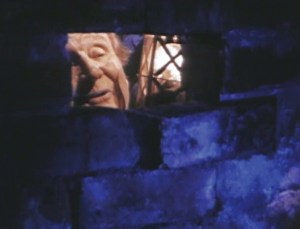 In a story from The Martian Chronicles, the fourth expedition has landed on Mars to discover that all the Martians are dead. Their bodies have been desiccated and crumbled down to ash-like leaves.
In a story from The Martian Chronicles, the fourth expedition has landed on Mars to discover that all the Martians are dead. Their bodies have been desiccated and crumbled down to ash-like leaves.
This is due to chicken pox brought by the Earthmen. Hey, just like the evil Europeans brought disease to the Indians — get it? Actually, PC horseshit aside, it is a great basis for a story, even if it was used earlier in War of the Worlds. In a nice callback, the disease was possibly brought by Captain Black’s crew from Mars is Heaven.
 Spender (David Carradine) is the only one of the crew that takes the time to reflect on the devastation they have caused, the destruction of an entire civilization.
Spender (David Carradine) is the only one of the crew that takes the time to reflect on the devastation they have caused, the destruction of an entire civilization.
The yahoos immediately begin giving the Martian landscape earth names. Crewman Biggs proclaims this to be Biggstown and immediately throws a can on the ground as the first litter. All that’s missing is an Italian Martian shedding a single tear. Spender punches Biggs, devolving to the violence inevitable to progressive, utopian types; although it usually takes more than 3 seconds. He really had it coming, though.
 They discover a structure with hieroglyphics, which turns out to be a library. Captain Wilder points out the lack of books. Spender holds up one glass volume and says they’re all in here — a Martian Kindle. Naturally Biggs tosses it to the ground, smashing it.
They discover a structure with hieroglyphics, which turns out to be a library. Captain Wilder points out the lack of books. Spender holds up one glass volume and says they’re all in here — a Martian Kindle. Naturally Biggs tosses it to the ground, smashing it.
Spender disappears for 3 days, and who wouldn’t want to get away from these idiots? Much like the crew of Prometheus, these guys seemed to have been loaded onto the back of a pick-up in front of Astronaut Depot rather than being recruited from the scientific community.
Our favorite imbecile Biggs is having a good ol’ time shooting cans. Aside from littering the area, it seems irresponsible to start blowing holes in water bottles when you’re in a desert, and don’t know if or when another ship will ever come. For God’s sake, will someone just shoot this guy? Happily, Spender does just that.
 Back at the camp, he shoots 2 more members of the crew. He spares the one man who has Cherokee ancestry — and Bradbury makes sure we get this by naming him Cheroke.
Back at the camp, he shoots 2 more members of the crew. He spares the one man who has Cherokee ancestry — and Bradbury makes sure we get this by naming him Cheroke.
Because of his Indian heritage, Spender expects him to understand his vengeance on the Earthmen for destroying the Martians. Cheroke, not being the caricature he is set up to be, can’t go along with Spender; so he is also shot. Luckily his family — Commanch, Apach and Pawn — were not there to see it.
The rest of the crew hunts down Spender. He plans to meet every expedition that lands and kill them. He figures he can keep Mars pristine for about 80 years. That will require some vigilance, one dude protecting an entire planet.
Spender points a gun at the Captain forcing Wilder to shoot him — suicide-by-astronaut. It then falls to the Captain, somewhat sympathetic to Spender’s theories, to protect the new world.
A pretty good story. Carradine is good in his usual role of self-righteous outsider. Even the minimalist , budget-driven sets work.
The episode sticks pretty close to the short story. However, the story is really in Bradbury’s wheelhouse and he knocks it out of the park (to mix metaphors).
Post-Post:
- First published in Thrilling Wonders Stores, June 1948.
- It also includes elements from another story in The Martian Chronicles — The Settlers.
- Title Analysis: I don’t get it at all, but then I’m not much into poetry — based on a poem by Lord Byron.










